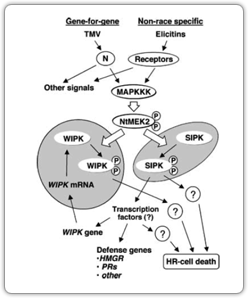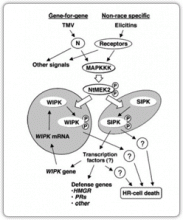(Hailing Jin, UC Berkeley)
Plant mitogen-activated protein kinases (MAPKs) represented by tobacco wounding-induced protein kinase (WIPK) have unique regulation at the level of transcription in response to stresses. By using transcriptional and translational inhibitors, it has been shown previously that WIPK gene expression and de novo protein synthesis are requires for the high-level activity of WIPK in cells treated with elicitins from Phytophthora spp. However, regulation of WIPK expression and the roles (s) of WIPK in plant disease resistance are unknown. We demonstrated that WIPK gene transcription is regulated by phosphorylation and de-phosphorylation events. Interestingly, salicylic acid-induced protein kinase (SIPK) was identified as the kinase involved in regulating WIPK gene expression based on both gain-of-function and loss-of-function analyses. This finding revealed an additional level of interaction between SIPK and WIPK, which share and upstream MAPKK, NtMEK2. Depending on whether WIPK shares its downstream targets with SIPK, it could either function as a positive feed-forward regulator of SIPK or initiate a new pathway. Consistent with the first scenario, co-expression of WIPK with the active mutant of NtMEK2 leads to accelerated hypersensitive response (HR)-like cell death in which SIPK also plays a role. Mutagenesis analysis revealed that the conserved common docking domain in WIPK is required for its function. Together with prior reports that (i) WIPK is activated in NN tobacco infected with tobacco mosaic virus, and (ii) PVX virus-induced gene silencing of WIPK attenuated N gene-mediated resistance, we concluded that WIPK plays a positive role in plant disease resistance, possibly through accelerating the pathogen-induced HR cell death.
- Liu, Y., Jin, H., Yang, K., Kim, C. Y., Baker, B. and S. Zhang (2003) Interaction between two mitogen-activated protein kinases during tobacco defense signaling The Plant Journal 2:149-160

